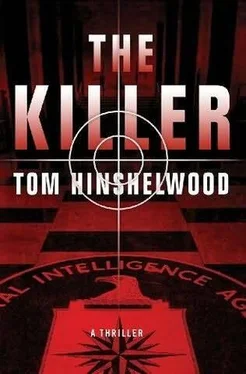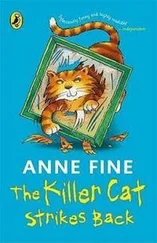The target rushed up the hotel steps with his two companions following behind. Each had a knapsack over their shoulder and one carried a large sports bag in each hand. The dossier had stated that they would be armed. Both were former commandos, and that alone gave Reed cause to respect them, but they were on a diving-and-demolitions expedition and were not bodyguards. Reed had no plans to kill either unless they were unfortunate enough to get in his way.
The client had arranged weapons for him to collect on arrival: a rifle and a handgun. The rifle, an Armalite AR-15 assault rifle equipped with an optical sight for sniping, was hidden under some discarded tires half a mile away. The handgun, a Glock 17 with attached suppressor, was in Reed’s shoulder bag. Both had already been checked, stripped, and thoroughly cleaned by Reed. Given such firepower, his employer’s note, that the target’s death should not appear natural or accidental, was somewhat redundant.
Reed did not plan on using either weapon. The locale was not a good one for sniping-narrow, busy streets that offered little chance of a clean line of sight. The handgun was more appropriate to the environs, but given the choice Reed preferred the more intimate effect afforded by a blade.
He was still waiting for the order from the client and had already decided the hotel would be the best strike point. Executing the target on the street was an option, but Reed didn’t want to create a scene unless he had to. A quiet execution in a hotel room was considerably more appealing. He was eager to complete this job without creating a commotion. That he had used a bomb in Cyprus continued to gnaw at his professional sensibilities.
The target disappeared through the hotel’s front entrance, and Reed checked his watch. A Tanzanian man in an oil-stained T-shirt tried to sell him coconuts. The man spoke in his native Swahili. Reed spoke several languages fluently, had a reasonable grasp of several more, but Swahili was, and never would be, one of them. When Reed shook his head, the man tried broken English, the language of Tanzania’s post-German masters. Reed removed his sunglasses, and the man, unnerved by the look in Reed’s eyes, turned and left him alone.
Reed replaced his sunglasses and approached the hotel. The bright sun prevented him from seeing through the glass of the windows or doors. He gave the target a generous four minutes to leave the lobby and then crossed the street. He pushed through the revolving entrance. The lobby was several degrees cooler than outside, the large ceiling fans working hard to keep the room a pleasant temperature. Immediately Reed became more aware of the sweat on his skin.
As he expected, the target and his companions were absent. Reed approached the front desk and paid for a single room with cash and took the stairs to the fifth floor. The hotel used regular metal keys, and Reed found a quaintness that at least one corner of the world had yet to be modernized. It would also make it easier to get through locked doors if he had to be quiet. Reed’s room was functional and clean, but the décor was bland. No matter. Reed was not there to enjoy himself.
He unslung his shoulder bag and removed the handgun. He placed the weapon under one of the bed’s pillows. Carrying the bag around was to be avoided. It would draw attention. He spent ten minutes examining the room before he opened the window to let in some air. He had no plans to stay in the hotel, but the room gave legitimacy to his presence. His white face made him too recognizable to linger in the vicinity otherwise.
The dossier already told him that the target was staying in room 314. The two divers were down the hall in 320. There was an elevator and two sets of stairs. Reed always preferred to use stairs if it was practical to do so. In an elevator he was virtually trapped and completely exposed when the doors opened to whomever was waiting. He exited the room and returned to the lobby.
There was a modest hotel bar that seemed pleasant enough. He bought a bottle of mineral water and took a seat where he could see enough of the lobby to know if the target left. Reed had been informed that his prey would be in Tanga for at least a couple of days, but the Englishman was nonetheless prudent. The mineral water was refreshingly cold. He was a little bored.
Though Reed had killed five people inside a week and was due to kill another shortly, only killing the target he knew as Tesseract had given him anything close to satisfaction. Even that was limited, since dispatching him had placed no real demands on Reed’s considerable skills. He had originally given Tesseract credit for his performance in Paris, but now concluded that surviving that attack had more to do with the incompetence of the assailants than with Tesseract’s own ability. A truly capable professional would not have been killed so easily in Cyprus. It was a shame that a potentially worthy adversary had been found so wanting-lamentable, but Reed had yet to encounter anyone who lived up to such a mantle. In short, Tesseract was an amateur compared with Reed.
The bar was almost empty except for some foreigners who were grouped in a corner and laughing over a few drinks. Reed took a small sip from his water. Maybe it was time to only take challenging contracts. It was more befitting to his abilities that way. Perhaps until the new year he should perform only for the Firm and decline any private offers that came his way. Well, unless they appealed to his sense of adventure. Reed was getting ahead of himself, he knew. He still had this job to complete, and untaxing as it was, he still needed to keep his focus. When one’s concentration waned, mistakes followed. Reed’s Smartphone was in the pocket of his trousers. He took it out and placed it on the table before him.
He waited.
Falls Church, Virginia, U.S.A.
Sunday
12:05 EST
It took a few seconds for the ringing phone to pull Ferguson from his sleep and another few before he understood what had woken him. Decades had passed since Ferguson had needed to be on guard while resting, and his once-acute senses had dulled with age and inactivity. He reached out a thin hand to grab the phone.
His voice was croaky. “Yes?”
“It’s done.”
“Who is this?”
It was Sykes. He spoke hurriedly, frantically. “We’ve got the missiles, well two of them, what we could get from them. We’ll go back tomorrow, see what else we can salvage. They doubt we’ll get anything though.”
“Slow down,” Ferguson said. “And tell me again.”
Sykes spoke more slowly, describing exactly what had been extracted and the situation regarding the remaining missiles. Ferguson took a few moments to digest what he was being told. He sat up.
“You have two of the missiles? In your possession?”
“Not one hundred percent of them, but propulsion, electronics, etcetera. In a truck outside.”
Ferguson stared into the shadows of his bedroom. The drapes were closed to stop the sun from interrupting his nap. He felt as though someone had injected him with pure joy.
“That’s tremendous news. Well done, Mr. Sykes.”
“Thanks.”
Sykes’s toned echoed none of Ferguson’s own happiness. Not that it mattered.
“Stay in your hotel and keep a low profile tonight, and tomorrow you can see what else can be recovered.”
“Okay.”
Ferguson hung up. He climbed off the bed and made his way downstairs and into his study. He felt tired, both in mind and body, but at least it was almost over. Just another messy assignment in a lifetime of necessary but untidy service to his nation. A nation that had registered him obsolete. After all those years of faithful service it was surely only right that he receive a generous retirement package.
Читать дальше












